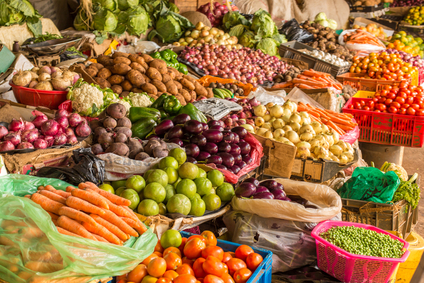I grew up in a grocery story. This is a family story that began before I was born. My father began working in the early fifties as a bag boy (also known then as a sacker) for a small grocery chain near Nashville, Tennessee. He and my mother met in the store, and a romance that began with a smile ended up at the end of an aisle—a church aisle.
By the time Dad’s little pumpkin, as he liked to call me, entered the world, he was moving up the hierarchy of management. When I was eight years old, a new store in the chain opened, and Dad was appointed the manager. I knew my Daddy was THE BOSS, and visions of free Hershey Bars danced in my head.
When I accompanied my mother to do the grocery shopping, my dad would often walk with me to the cold drink machine (pronounced cold “drank” by some Southerners). The machine was located next to the shelves lined with Cheetos–the puffy kind that painted my fingers orange—and other salty snacks: Mr. Peanut peanuts, crispy pork rinds, corn chips, and skinny, fat-enriched potato sticks in a can. My cold “drank” of choice was Nehi Orange in a glass bottle, purchased for a dime. I’d stick the coin in a slot, open the machine door, grab the neck of the bottle, give it a tug, and out it came, cold and sweaty in my hand.
On the weekends, the “sample lady,” Mrs. Wise, served small cups of the store brand coffee, “Fit For A King,” and petite biscuits filled with Tennessee country sausage. The fragrance of breakfast greeted the customers as soon as they crossed the threshold of the store. Mrs. Wise was gracious to me and turned her head, pretending not to notice the multiple times I swiped biscuits from her serving tray.
In that store, I received a cornucopia of knowledge about fruit and vegetables from my dad. Tap a watermelon. If it sounds hollow, it is ripe and ready to cut, eat, and let the juice run down your chin. A ripe cantaloupe smells sweet. Pull back the husk of an ear of corn and look for plump rows of kernels unblemished by rotten or wormy areas.
Dad bought “local” from area farmers before “local” was part of the American food conversation. Clear glass jars of dark amber sorghum molasses made by a nearby Mennonite community enticed customers with the promise of a sweet, thick, syrupy spread for a hot buttered biscuit. Freshly dug sweet potatoes were piled high in bins, ready to accompany a customer home for baking or to use in a Thanksgiving casserole with sticky marshmallows on top.
My dad is eighty-four now, and he does the grocery shopping for himself and my mom. When I visit them, I enjoy accompanying him to a large, sprawling market unlike the grocery store where I grew up. As he gets in the car, he pats his shirt pocket to check if his coupons have stayed put. His eyes light up as he tells me the latest prices for items and compares them to the prices during his days at the helm of his store.
As soon as we enter through the sliding glass doors, Dad steps nimbly and heads for the produce section, leaving me behind as I struggle to pull out a shopping buggy that is stuck to the one in front of it. I see him from afar surveying the displays and posted prices.
I catch up with him and say, “You ran off and left me.”
He walks with purpose like a physician on her hospital rounds examining patients. He thumps and listens, feels and sees as he diagnoses the health of the produce with ease and expertise.
I look at his hands, speckled with age, and I am thankful for the work of those hands and his kindnesses to customers and vendors, and to me. I remember the fizzy, orange taste of a Nehi, the clink of the glass bottle against my teeth, and the fragrance of sausage frying and coffee brewing.
“Come on,” Dad says. “I need to get some yogurt for your mama.”
As I turn my buggy around, I tap the corner of a display of red polished apples and several roll from top to bottom. I quickly rearrange the wayward apples.
As always, I’m a grocer’s daughter.
